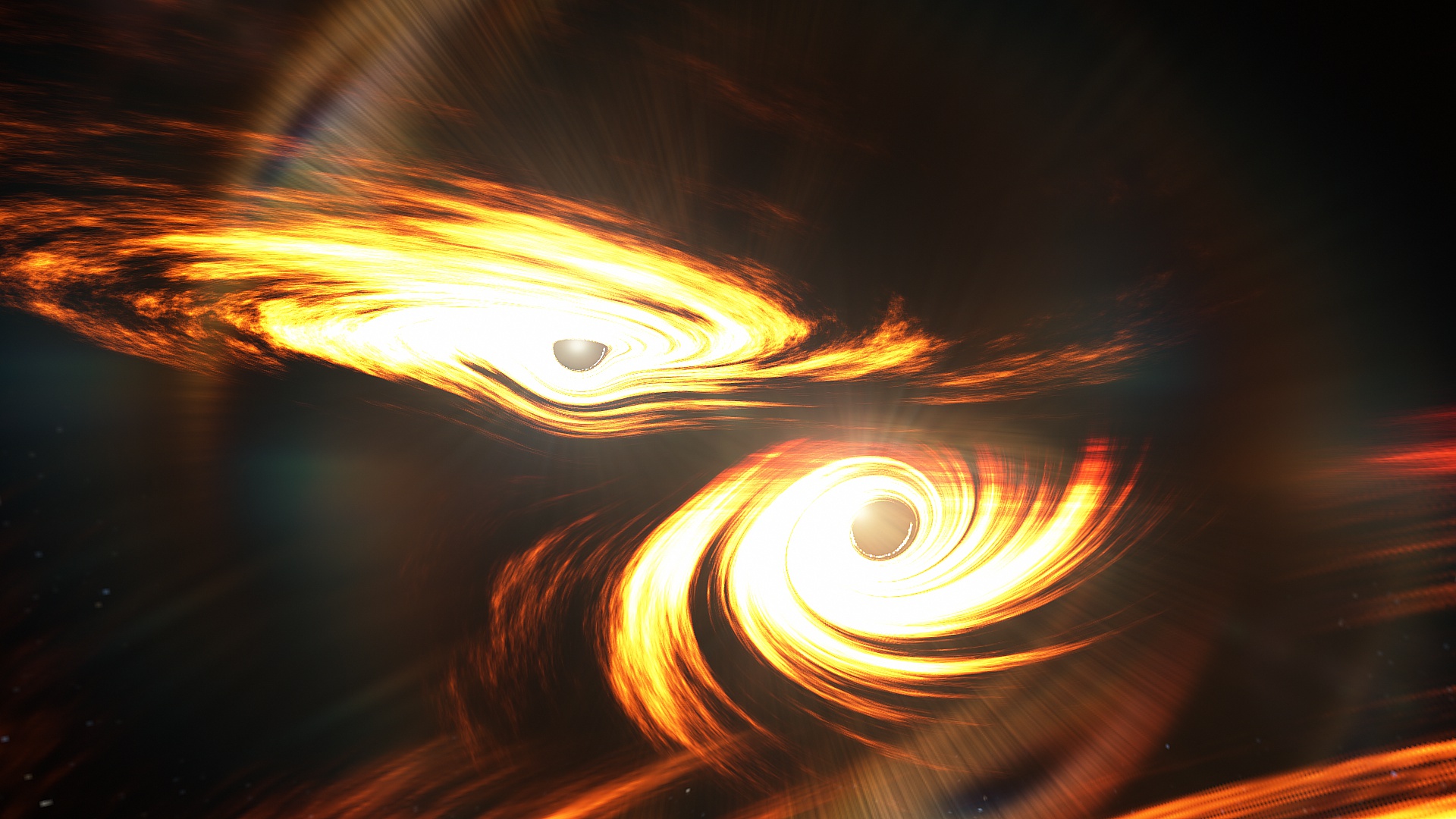OzGrav makes waves with $35m to understand the universe

Artist's impression of two black holes in the process of merging. Image credit: Mark Myers, OzGrav/Swinburne University of Technology
In summary
- The Australian Research Council has awarded the Centre of Excellence for Gravitational Wave Discovery (OzGrav) at Swinburne a further $35 million in funding
- Since its opening in 2017, OzGrav researchers have been at the forefront of gravitational wave research, making significant discoveries to help understand the extreme physics of black holes and warped spacetime
- The international collaboration is based at Swinburne, with Professor Matthew Bailes as Centre Director
The Australian Research Council Centre of Excellence for Gravitational Wave Discovery (OzGrav) at Swinburne has been awarded a further $35 million in funding to continue their ground-breaking discoveries at the cutting edge of human understanding.
The new funding will support OzGrav’s work investigating the fundamental nature of relativistic gravity, ultra-dense matter and the universe, generating critical discoveries to cement Australia’s leadership role in the growing field of gravitational wave science.
Centre Director Professor Matthew Bailes says the funding will not only allow OzGrav make to landmark discoveries about the nature of our universe, but also lay the foundations for the Australian mega-science instruments that could transform physics in the 2030s and 2040s.
“When OzGrav launched in 2017, we contributed to the birth of a new era of astrophysics. This reinvestment will put us at the forefront of transformational scientific discoveries well into the next decade,” Professor Bailes says.
"The opportunity to attract and work with the talented young scientists and engineers this Centre will attract is incredibly energising.
“By improving our advanced gravitational wave detectors, we will be able to understand more about our universe, probing neutron stars and black holes and mapping the cosmic evolution of the universe.”
Turning Einstein’s imagination into reality
Gravitational waves, first predicted by Albert Einstein in 1915 in his theory of general relativity, went undetected for one hundred years before scientific advancements enabled their detection for the first time in 2015.
Since then, OzGrav researchers have been at the forefront of gravitational wave discovery, making significant discoveries to help understand the extreme physics of black holes and warped spacetime.
“As a technology-focused university with deep expertise in astronomy, physics and space research, Swinburne is proud to continue to be the home of this global collaboration,” says Deputy Vice-Chancellor, Research Professor Karen Hapgood.
“Under the directorship of Professor Matthew Bailes, OzGrav has made a number of field-defining contributions to our understanding of the universe.
“By building closer relationships with industry and through our leading space education programs, we look forward to expanding this impact and inspiring the next generation of graduates in Australia’s high-tech workforce.”
Next-generation discoveries
The new funding from the Australian Research Council will enable OzGrav to maximise the sensitivity and yield of gravitational wave detectors, supressing quantum noise and reducing coating losses. This is expected to increase detection rates by over an order of magnitude. This will enable:
- The discovery of new sources of gravitational waves and extreme electromagnetic events
- Testing the boundaries or Einstein’s theory of general relativity in the strongest gravitational fields in the universe, using black holes and pulsars
- Understanding ultra-dense matter through the observation of neutron stars and their mergers
- Mapping the cosmic evolution of the universe using gravitational waves and fast radio bursts
OzGrav is also committed to strengthening equity and diversity in this sector and increasing participation and career options for under-represented groups in STEM. Through schools outreach, the Centre also aims to inspire the next generation to pursue a career in STEM, especially at an age when many young women and under-represented groups choose to not take STEM subjects.
Headquartered at Swinburne University of Technology, OzGrav is a collaboration between a number of Australian universities, including the University of Queensland, The Australian National University, The University of Sydney, Monash University, The University of Adelaide, The University of Western Australia and The University of Melbourne, and CSIRO.
Other international partners include the NASA Goddard Space Flight Centre, Massachusetts Institute of Technology (MIT) and the Laser Interferometer Gravitational-Wave Observatory in the United States, as well as institutions in the US, the Netherlands, Germany, Italy and the UK.
-
Media Enquiries
Related articles
-

- Astronomy
High school students work with Swinburne astronomers on the future of space
Swinburne’s Youth Space Innovation Challenge has inspired over 330 Australian teenagers to pursue a career in STEM.
Friday 26 July 2024 -

- Astronomy
- Science
Swinburne appoints new Director of Innovative Planet Research Institute
Leading geodesy expert, Professor Allison Kealy, has been appointed as the inaugural Director of Swinburne University's Innovative Planet Research Institute.
Monday 22 April 2024 -

- Astronomy
- University
OzGrav 2.0: A ‘new era of astrophysics’ launched at Swinburne
The next phase in the world-leading ARC Centre of Excellence for Gravitational Wave Discovery, dubbed 'OzGrav 2.0', launched this week at Swinburne University of Technology.
Wednesday 17 April 2024 -

- Design
- Astronomy
- Technology
- University
Swinburne ‘Rock Muncher’ takes part in Australian Rover Challenge
A multidisciplinary student team from Swinburne University of Technology competed in the 2024 Australian Rover Challenge held in Adelaide, South Australia.
Thursday 11 April 2024 -
.jpeg/_jcr_content/renditions/cq5dam.web.256.144.jpeg)
- Astronomy
New JWST observations reveal black holes rapidly shut off star formation in massive galaxies
New research showcases new observations from the James Webb Space Telescope that suggest black holes rapidly shut off star-formation in massive galaxies by explosively removing large amounts of gas...
Tuesday 23 April 2024

